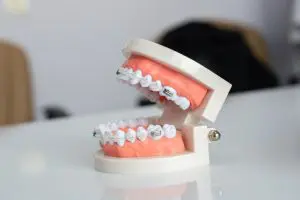Sometimes our teeth have a mind of their own.
You’ve heard of an overbite, but did you know underbites are a common dental issue, too? An underbite is a dental condition in which your bottom teeth extend farther forward than your top teeth.
The alignment of your teeth has a significant impact on your self-confidence but also your overall health. Unfortunately, most adults are not born with perfectly straight and aligned teeth.
In some cases, it’s not just your teeth that need straightening. Sometimes your jaw needs to be worked on as well.

(Enis Yavuz/unsplash)
What are the Effects of an Underbite?
The way your jaw sits influences your teeth and your bite. When you have an underbite, it could cause many problems with your chewing, digestion, and more. Here’s a closer look:
- Temporomandibular Joint Disorder (TMD). Having an underbite can cause issues with your temporomandibular joint. This is the joint that connects your skull to your jaw. Sometimes people refer to this as lockjaw. It feels as if your jaw is locked in one position and is very painful to move. It may cause jaw clicks as well.
- Halitosis (aka bad breath). Are you constantly popping mints and never seem to have minty breath? An underbite can cause you to breathe through your mouth and jut your tongue up against your teeth. This can create more opportunities for bacteria to grow in the mouth, leading to dreaded bad breath.
- Snoring: Your underbite may cause your spouse to sleep in the guest room every night. If you have an underbite, there’s a greater chance you may be a loud snorer. Mystery solved!
- Sleep apnea: This is a condition where someone stops breathing during random points in their sleep cycle. Those who have sleep apnea rarely get a good night’s rest. Those with this condition may experience severe fatigue during the day due to a lack of quality sleep at night.
What Causes an Underbite?
It could just be bad luck, but some factors may contribute to the likelihood of having an underbite.
- Genetics. Thank your mom or dad for passing down their jaw structure to you. If someone in your family history had an underbite, there’s a good chance you’ll have one, too.
- Injury. Breaking your jaw could cause an underbite. It is possible for your jaw to heal back to its original state, but sometimes that doesn’t happen, and you’re left with a misaligned jaw.
- Childhood Habits. We all know someone who sucked their thumb way too long. Some habits such as sucking the thumb, using a pacifier well past infancy, and bottle feeding can cause changes to the jaw shape if done excessively.
- Tumor. A tumor is rare and extreme, but cancer growth can shift the jaw, resulting in an underbite.
What To Do About an Underbite
Severe underbite cases may require surgery, but most patients can be treated with standard orthodontic treatment. It’s best to treat an underbite in childhood or teen years because the jaw is still moldable and easy to manipulate with orthodontic methods. Treatment for adults with underbite may take longer or may require surgery.
The treatment depends on the severity of the case. Treatments for an underbite include:
- Braces. Braces can correct mild underbites. As braces straighten your teeth, they also realign your jaw. After you get your braces off, don’t forget to wear your retainer to keep the new shape!
- Head Gear. No one loves head gear, but sometimes it is necessary to fix an underbite. It rests on your forehead and chin; then, elastics attach to your upper jaw and the face mask. It works to pull your upper jaw forward and realign the upper and lower jaw.
- Elastics. Elastics have the same purpose as the headgear. They attach to mini-plates that are anchored in the skull and work to pull the upper jaw forward to align the jaw.
- Surgery. If the case is extremely severe, surgery may be the best option. Surgery is usually only performed on adults whose jaws have stopped growing.
Bottom line: get your underbite fixed. Fixing your teeth and jaw will work wonders for your self-esteem and overall health. This may be the solution to many issues you had no idea your underbite was causing. Start with a visit to your Utah family dentist. They can assess the severity of your underbite and recommend the best treatment.
Whether you have an underbite, need tooth fillings in the Layton area, or are due for a cleaning, contact Felt Family Dentistry today.
